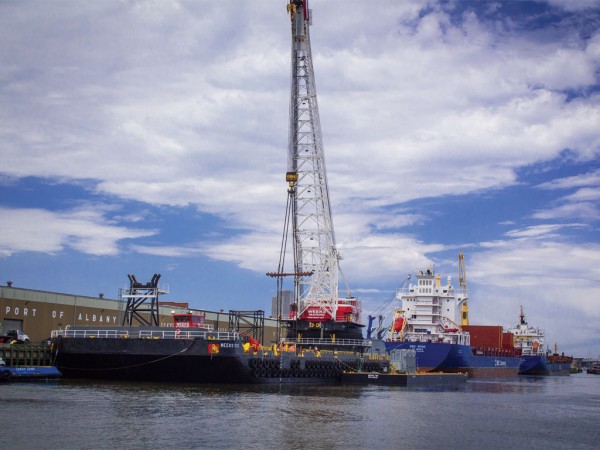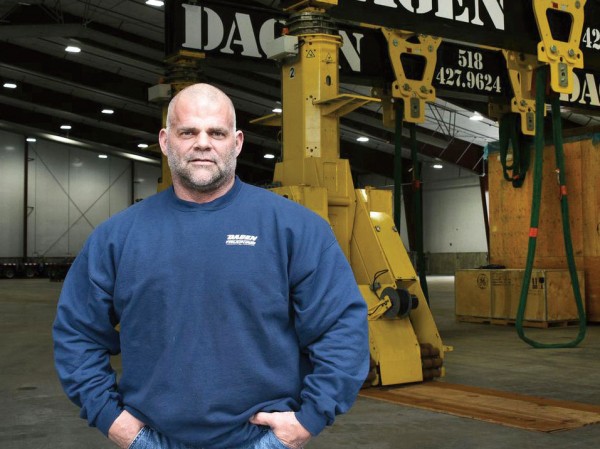Serving industries in New York’s “Central Tier”, the greater Albany area and western Massachusetts, the port of Albany provides a vital link for the movement of break bulk and project cargo to the region. Served by two major class 1 railroads and with immediate access to the interstate highway system, the port extends its reach far beyond its geographic boundaries.
There are forty two river ports in the United States. In terms of size and cargo volume New Orleans ranks as the largest, but the Port of Albany consistently scores within the top 100. From its modest beginnings in 1624, Albany served as a trading post for furs, timber and produce sold within the region and beyond. The Hudson River Sloop “Experiment” became only the second American ship to sail to China when it departed from Albany in 1785, and in 1809 Robert Fulton’s Clermont was declared the first commercial steamboat as it left Albany bound for New York harbor. The port district was established under New York State charter in 1925 but construction of the current port began in 1932 under “New Deal” legislation. Albany has been growing ever since.

Located 124 miles from New York Harbor, the Port of Albany consists of nearly 400 acres of land on both sides of the Hudson River, with the majority of space on the Albany side. Tony Vasil, the port’s director of business development, explains, “The dock system is 5,700 feet broken up with 4,500 feet on the Albany side and 1,200 feet in Rensselaer with most of the terminal operations taking place in Albany. The depth along side is 31’ at the quay and also in the Hudson Channel.”
Federal Maritime Terminals operates 5 berths, 270,000 sq ft of warehouse space and 20 acres of open storage area. Two Liebherr mobile cranes with a capacity of up to 110 metric tons, serve the port’s heavy lift requirements. Barge mounted cranes offer an additional 1,000 short tons of lift to round out the port’s capability. FMT is able to handle everything from GE Energy turbines to scrap iron and forest products. “We recently were successful with a European forest products producer to secure an additional volume to that already moving through the port,” Tony said.
Last year Albany received 72 vessel and or barge calls handling 327,561 short tons of cargo. The main quay, a 2,499 linear foot wharf, is connected to the CSX -CP main line by an on dock rail spur operated by the Albany Port Railroad which is jointly owned by both lines. The wharf, rated at 1,200 pounds per square foot, is more than capable of handling the GE turbines exported worldwide but a new ramp to be completed this summer will speed delivery of these units to waiting roll on/roll off vessels. The new Big Lift warehouse a 45,000 sq ft facility opened in the 4th quarter of last year was taken over by Dagen Trucking. This warehouse will be one of the staging areas for turbines awaiting export.
Looking South for Expansion
Just east of Glenmont, a suburb of Bethlehem, the port had been considering land on Beacon Island to develop for potential projects. With competition growing in the Northeast, especially among project ports, Albany needed to step up their game in order to remain competitive. Megan Daly, the director of economic development and procurement, explains it this way, “The port has purchased 82 acres just south of us…it increases the overall Port of Albany footprint by 25%. It’s a lot of opportunity there. The main reason why we did it was, we just were running out of land, quite frankly, to develop. We actually had a market assessment and growth strategy done in 2016 and 17. One of the main things they concluded was in fact you’re losing out on opportunities because you don’t have the land to place it.” She continued, “So basically, adding to the logistics hub that the Port of Albany already is, adding warehousing, distribution, and light manufacturing, offering rail, road.” Daly said, “Our original goal was not to add new maritime in that 80 acres but use what we’re investing in right now.”
Looking toward new projects, the port has recently received a big initiative from New York State related to offshore wind power. They are including that as one of the more prominent options for land use as they move forward with their pre-development planning.
The Promise of Windpower
In 2017 Governor Cuomo announced the state’s commitment to developing 2.4 gigawatts of offshore wind power by 2030. A grid that large will generate enough electricity to power 1.25 million homes, providing naturally sustainable energy to replace its equivalent in fossil fuel. His first step was to approve the construction of a 90 megawatt facility 35 miles east of Montauk Point Long Island. LIPA (Long Island Power Authority) in conjunction with Deep Water Wind, the East Coast’s largest offshore manager, will begin construction of the “South Fork Wind Farm” in 2021. The facility is anticipated to go on line in 2022. Deep Water Wind is a division of Orsted Wind and part of the Orsted Energy Group of Fredericia Denmark. In its initial phase “South Fork” will have 15 turbines delivering electricity to the local grid in East Hampton, NY. Plans for the expansion of this facility from 90 to 130 megawatts are currently under review by LIPA. Offshore power is only one part of the state’s master plan for sustainable energy. Albany currently handles wind turbines moving throughout the Northeast, and Beacon Island could provide a perfect staging area for this equipment prior to movement to the various construction sites.
Expanding Heavy Lift Cargo Through the Port
Dagen Trucking opened its doors twenty six years ago, and Jeff Dagen has grown the operation to become one of the premier heavy haulers in New York’s Central Tier. Operating several warehouses in the area, last November he leased the heavy lift facility at the port to handle a variety of projects which move through Albany. “The building was originally thought of and built for taking in the GE generator loads weighing up to roughly one million pounds,” Jeff Dagen said. It was constructed with a thicker floor and has on site rail to accommodate large project cargo. “I was working with the Port and said that I would lease it, and not only use it for the GE freight but… use it for other stuff too, heavy lift pieces such as transformers and other things.” This thinking has paid off, as GE Power will begin ramping up construction of thermal turbines from their plant in Schenectady. “Looking towards the third quarter of this year going into the fourth quarter (and) into next year there will be more and more of those big, big loads coming in by rail.” Dagen will handle this equipment from train to ship as Albany completes construction of the roll on/roll off ramp this summer which will accommodate these units and other large project pieces. Wind power is another area which Dagen is involved in. They currently handle turbines destined for inland locations, but they’ve also been working closely with the port. Dagen notes that ports from Connecticut to New Jersey are all vying to handle the influx of new equipment prior to construction. He feels Albany is a perfect location, as he says, “all those ports want that work but there’s not that much room down there. There is more room up here at less of a premium price.”

Diversity is the name of the game to stay competitive in heavy hauling and Dagen Trucking personifies that diversity. In addition to the heavy lift projects noted above the firm is also involved in the handling and transport of rail cars. “We have started to take in passenger car train shells at the port of Albany for CRRC. We then transport them to the CRRC manufacturing plant in Springfield, MA where they are completed. Once they are completed, we then transport them to the MBTA/Wellington, MA yard just north of Boston. We recently leased the 45,000 sq/ft heavy lift building in the port of Albany. We also purchased a 1000 ton gantry crane and 2 brand new twelve line Famonville self-propelled trailers to support incoming and outgoing power equipment,” said Dagen.
A Bright Future for Albany
Dagen Trucking is strategically placed for the future, and it’s clear that they will grow along with Albany as it pursues an aggressive business plan. Additional manufacturing within the port district is one objective and wind power may help fulfill that goal. The ro/ro ramp will bring a new dimension to cargo handling and it will help maintain their competitive edge. Albany’s vision and forward thinking propels them above the status as a niche port.





